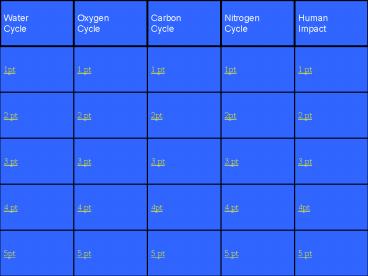PowerPoint Presentation - Blank Jeopardy PowerPoint PPT Presentation
1 / 51
Title: PowerPoint Presentation - Blank Jeopardy
1
Water Cycle
Oxygen Cycle
CarbonCycle
NitrogenCycle
Human Impact
1 pt
1 pt
1pt
1 pt
1pt
2 pt
2 pt
2pt
2pt
2 pt
3 pt
3 pt
3 pt
3 pt
3 pt
4 pt
4 pt
4pt
4 pt
4pt
5pt
5 pt
5 pt
5 pt
5 pt
2
Water changes from a gas to a liquid
through_______ a. Condensationb.
Evaporationc. Infiltrationd. Transpiration
3
Water changes from a gas to a liquid
through_______ a. Condensation
4
Water changes from a liquid to a gas
through_______ a. Condensationb.
Evaporationc. Infiltrationd. Transpiration
5
Water changes from a liquid to a gas
through_______ b. Evaporation
6
Water goes into the ground through________
a. Condensationb. Evaporationc.
Infiltrationd. Transpiration
7
Water goes into the ground through________
c. Infiltration
8
Plants return water to the atmosphere
through_____ a. Condensationb.
Evaporationc. Infiltrationd. Transpiration
9
Plants return water to the atmosphere
through_____ d. Transpiration
10
The watery layer of the earth is called
the___________ a. Atmosphereb.
Lithospherec. Hydrosphered. Precipitation
11
The watery layer of the earth is called
the___________ c. Hydrosphere
12
The symbol for Carbon is__ a. Cb. Carc.
Cb
13
The symbol for Carbon is__ a. C
14
Humans and animals breathe out ___________ a.
Oxygenb. Carbonc. Carbon dioxided.
Nitrogen
15
Humans and animals breathe out ___________ c.
Carbon dioxide
16
A colorless, odorless flammable gas that is the
major part of natural gas is a. Carbon
dioxideb. Methanec. Nitrogen
17
A colorless, odorless flammable gas that is the
major part of natural gas is b. Methane
18
Photosynthesis converts _____ and _____ into
carbohydrates. a. Carbon dioxide and waterb.
Oxygen and waterc. Nitrogen and water
19
Photosynthesis converts _____ and _____ into
carbohydrates. a. Carbon dioxide and water
20
Photosynthesis occurs in_____ a. Humansb.
Animalsc. Plants and treesd. Factories
21
Photosynthesis occurs in_____ c. Plants and
trees
22
The gaseous envelope surrounding the earth is
the_______ a. Biosphereb. Lithospherec.
Atmosphere
23
The gaseous envelope surrounding the earth is
the_______ c. Atmosphere
24
The process that breaks apart simple food
molecules to release energy is________ a.
Photosynthesisb. Combustionc. Respiration
25
The process that breaks apart simple food
molecules to release energy is________ c.
Respiration
26
Another name for glucose is a. Protein b.
Fatc. Solutiond. Sugar
27
Another name for glucose is d. Sugar
28
Substances reacting with oxygen to give heat and
light is called______ a. Protein b.
Combustionc. Respirationd. Sugar
29
Substances reacting with oxygen to give heat and
light is called______ b. Combustion
30
The solid part of the earth consisting of the
crust and the outer mantle is called
the__________ a. Biosphere b. Atmospherec.
Lithosphered. Sugar
31
The solid part of the earth consisting of the
crust and the outer mantle is called
the__________ c. Lithosphere
32
The most abundant element in the earths
atmosphere is_______ a. Oxygen b. Carbonc.
Waterd. Nitrogen
33
The most abundant element in the earths
atmosphere is_______ d. Nitrogen
34
What percent of the atmosphere is nitrogen? a.
85b. 81c. 78d. 70
35
What percent of the atmosphere is nitrogen?
c. 78
36
Gaseous nitrogen must be fixed by ________ before
it can be used. a. oxygenb. carbonc.
bacteriad. germs
37
Gaseous nitrogen must be fixed by ________ before
it can be used. c. bacteria
38
Nitrogen is pass through the_________ a.
waterb. food chainc. oxygen cycled. air
39
Nitrogen is pass through the_________ b.
food chain
40
When an organism dies, _______ break down the
body. a. producersb. usersc.
decomposersd. air
41
When an organism dies, _______ break down the
body. c. decomposers
42
Burning fossil fuels and forests releases various
forms of nitrogen contributing to global warming
and acid rain. True or False
43
Burning fossil fuels and forests releases various
forms of nitrogen contributing to global warming
and acid rain. True
44
Fewer plants means less oxygen and more carbon
dioxide. This enhances the balance of the
natural oxygen cycle. True or False
45
Fewer plants means less oxygen and more carbon
dioxide. This disturbs the balance of the
natural oxygen cycle. False
46
Every time something burns (combustion), more
carbon dioxide is released into the
atmosphere. True or False
47
Every time something burns (combustion), more
carbon dioxide is released into the
atmosphere. True
48
Combustion of fossil fuels adds sulfur and
nitrogen to the air. These mix with the water
vapor in the atmosphere and make it more
acidic. True or False
49
Combustion of fossil fuels adds sulfur and
nitrogen to the air. These mix with the water
vapor in the atmosphere and make it more
acidic. True
50
It is unnecessary to use alternative forms of
fuels like wind and solar forms. True or False
51
It is necessary to use alternative forms of fuels
like wind and solar forms. False

